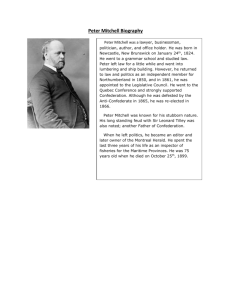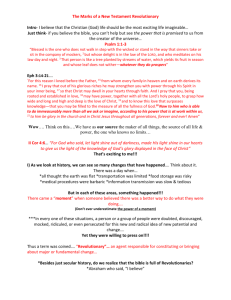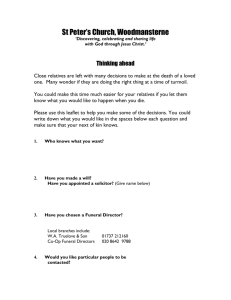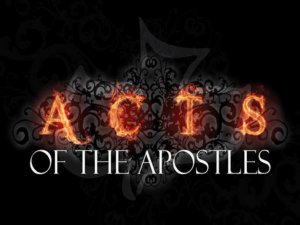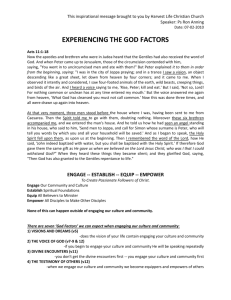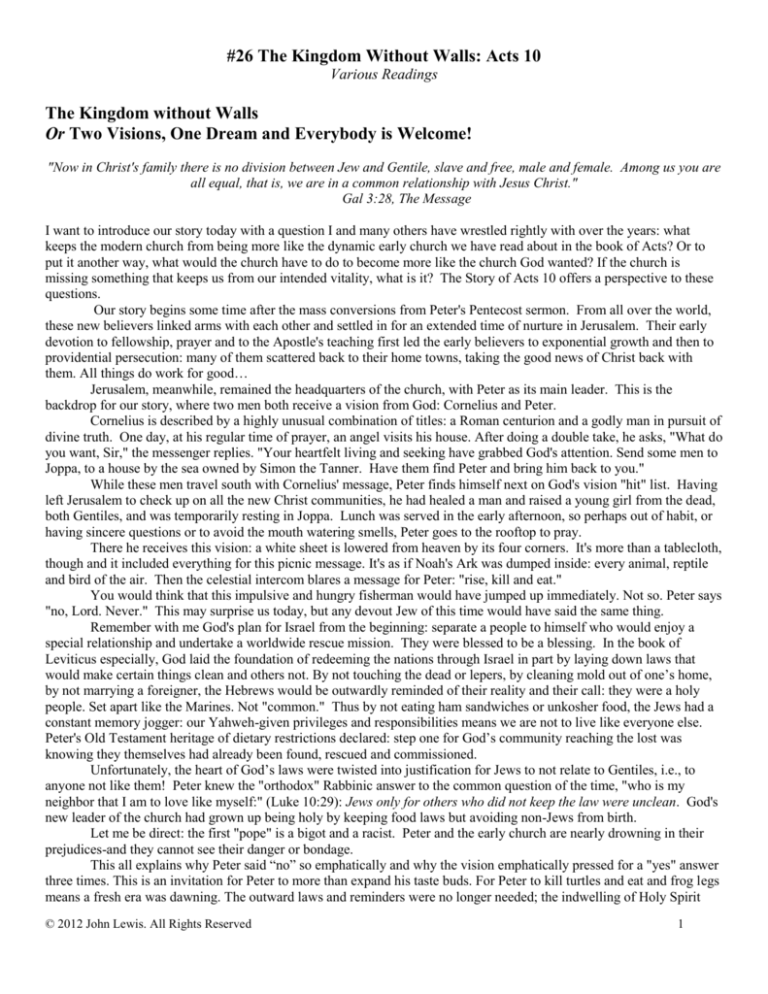
#26 The Kingdom Without Walls: Acts 10
Various Readings
The Kingdom without Walls
Or Two Visions, One Dream and Everybody is Welcome!
"Now in Christ's family there is no division between Jew and Gentile, slave and free, male and female. Among us you are
all equal, that is, we are in a common relationship with Jesus Christ."
Gal 3:28, The Message
I want to introduce our story today with a question I and many others have wrestled rightly with over the years: what
keeps the modern church from being more like the dynamic early church we have read about in the book of Acts? Or to
put it another way, what would the church have to do to become more like the church God wanted? If the church is
missing something that keeps us from our intended vitality, what is it? The Story of Acts 10 offers a perspective to these
questions.
Our story begins some time after the mass conversions from Peter's Pentecost sermon. From all over the world,
these new believers linked arms with each other and settled in for an extended time of nurture in Jerusalem. Their early
devotion to fellowship, prayer and to the Apostle's teaching first led the early believers to exponential growth and then to
providential persecution: many of them scattered back to their home towns, taking the good news of Christ back with
them. All things do work for good…
Jerusalem, meanwhile, remained the headquarters of the church, with Peter as its main leader. This is the
backdrop for our story, where two men both receive a vision from God: Cornelius and Peter.
Cornelius is described by a highly unusual combination of titles: a Roman centurion and a godly man in pursuit of
divine truth. One day, at his regular time of prayer, an angel visits his house. After doing a double take, he asks, "What do
you want, Sir," the messenger replies. "Your heartfelt living and seeking have grabbed God's attention. Send some men to
Joppa, to a house by the sea owned by Simon the Tanner. Have them find Peter and bring him back to you."
While these men travel south with Cornelius' message, Peter finds himself next on God's vision "hit" list. Having
left Jerusalem to check up on all the new Christ communities, he had healed a man and raised a young girl from the dead,
both Gentiles, and was temporarily resting in Joppa. Lunch was served in the early afternoon, so perhaps out of habit, or
having sincere questions or to avoid the mouth watering smells, Peter goes to the rooftop to pray.
There he receives this vision: a white sheet is lowered from heaven by its four corners. It's more than a tablecloth,
though and it included everything for this picnic message. It's as if Noah's Ark was dumped inside: every animal, reptile
and bird of the air. Then the celestial intercom blares a message for Peter: "rise, kill and eat."
You would think that this impulsive and hungry fisherman would have jumped up immediately. Not so. Peter says
"no, Lord. Never." This may surprise us today, but any devout Jew of this time would have said the same thing.
Remember with me God's plan for Israel from the beginning: separate a people to himself who would enjoy a
special relationship and undertake a worldwide rescue mission. They were blessed to be a blessing. In the book of
Leviticus especially, God laid the foundation of redeeming the nations through Israel in part by laying down laws that
would make certain things clean and others not. By not touching the dead or lepers, by cleaning mold out of one’s home,
by not marrying a foreigner, the Hebrews would be outwardly reminded of their reality and their call: they were a holy
people. Set apart like the Marines. Not "common." Thus by not eating ham sandwiches or unkosher food, the Jews had a
constant memory jogger: our Yahweh-given privileges and responsibilities means we are not to live like everyone else.
Peter's Old Testament heritage of dietary restrictions declared: step one for God’s community reaching the lost was
knowing they themselves had already been found, rescued and commissioned.
Unfortunately, the heart of God’s laws were twisted into justification for Jews to not relate to Gentiles, i.e., to
anyone not like them! Peter knew the "orthodox" Rabbinic answer to the common question of the time, "who is my
neighbor that I am to love like myself:" (Luke 10:29): Jews only for others who did not keep the law were unclean. God's
new leader of the church had grown up being holy by keeping food laws but avoiding non-Jews from birth.
Let me be direct: the first "pope" is a bigot and a racist. Peter and the early church are nearly drowning in their
prejudices-and they cannot see their danger or bondage.
This all explains why Peter said “no” so emphatically and why the vision emphatically pressed for a "yes" answer
three times. This is an invitation for Peter to more than expand his taste buds. For Peter to kill turtles and eat and frog legs
means a fresh era was dawning. The outward laws and reminders were no longer needed; the indwelling of Holy Spirit
© 2012 John Lewis. All Rights Reserved
1
had, since Pentecost, become what made their holiness clear. But that was just the beginning. The door to the world was
now to explode open, commanding the Jews once more to step out and share intimate fellowship with Gentiles. The
church would stagnate in Jerusalem, the lost remain left ignored worldwide, unless they themselves first walk through this
critical door of prejudice. And rightfully so, leaders must go first.
It took Peter then, as it does for most of us, more than one moments and type of conversion to become the leader
God intended. He had his first and vertical life-changer at the turning point of the gospels, at Caesarea Philippi: "who do
you say that I am? Will you let go of your misconceptions and believe I and my followers must suffer first?" But
apparently getting our belief and relationship right with God is not the end of it. In Acts 10, perhaps THE pivotal story of
the book of Acts, God brings Peter to Caesarea for his second equally earthshaking conversion: "will you let your walls
down and start with My view of neighbor?" As God shed Peter's human and divine misconceptions, this Jewish bigot
repented. He grew into shoes otherwise too big. And others followed in his steps. The early church, not surprisingly,
flourished under his leadership.
The rest of the story (Acts 10) reveals Peter's blurry-eyed obedience, the welcoming of the Gentiles and God's
continual realizing of His dream: a people that are truly inclusive. With this gate toward the Gentiles finally opened, a
volcano of activity began. The story of Acts accelerates from this point as the four corners of the Roman Empire are
invited to come, die and eat at table with Christ and his people.
It’s easy to overlook that part of the early church's uniqueness came from the blessing of God on its diversity. In
each community, rich and poor, Jew and Gentile, slave and free, woman and men began to relate to each other like never
before. Holy Spirit changed the social rules as she moved with fire in their hearts to build her church and help them catch
up to God’s purposes.
Here's what's at stake. To those who wonder why our American church lacks the luster of what we read in Acts,
look closely. Those who boast belief in Jesus as God and the Bible as infallible start well but these beginnings are not
enough. The challenge from the culture remains: Sunday morning is the most segregated hour in America all week.
Many evangelicals have orthodox views of Jesus but have not been converted on the horizontal question. Our churches
lack the growing diversity and Christ’s barrier-bashing of Peter and Cornelius. Country club churches and homogenous
growth strategies quench Holy Spirit to the same degree reconciliation pleases God and unleashes His power.
A number of years ago Lighthouse (UPS college ministry) and an inner city Pentecostal church called Lion of
Judah shared a time of joint baptism, with about six people from each group participating. We met down at the waterfront.
Harlan Shoop, a TCM board member and local white pastor came, stood with us, and gave us his church’s blessing.
Cordez Taylor, an African-American man and pastor of Lion of Judah, "co-dunked" the people with me and offered up
passionate prayer. Cordez and I became friends as we officed together with other ministries at a downtown church
education wing turned office space. For me this represented a version of Acts 10 in my own story, the lifting up a vision
of unity that goes beyond age, race and denominational barriers. May it not be so rare and long ago as I move forward in
this new season of life and ministry.
Lord, help us all-those working inside the church and parachurch-to drop more walls and move forward into your
future-that includes a mixture and melange of people that boggles our homogenous minds.
© 2012 John Lewis. All Rights Reserved
2


